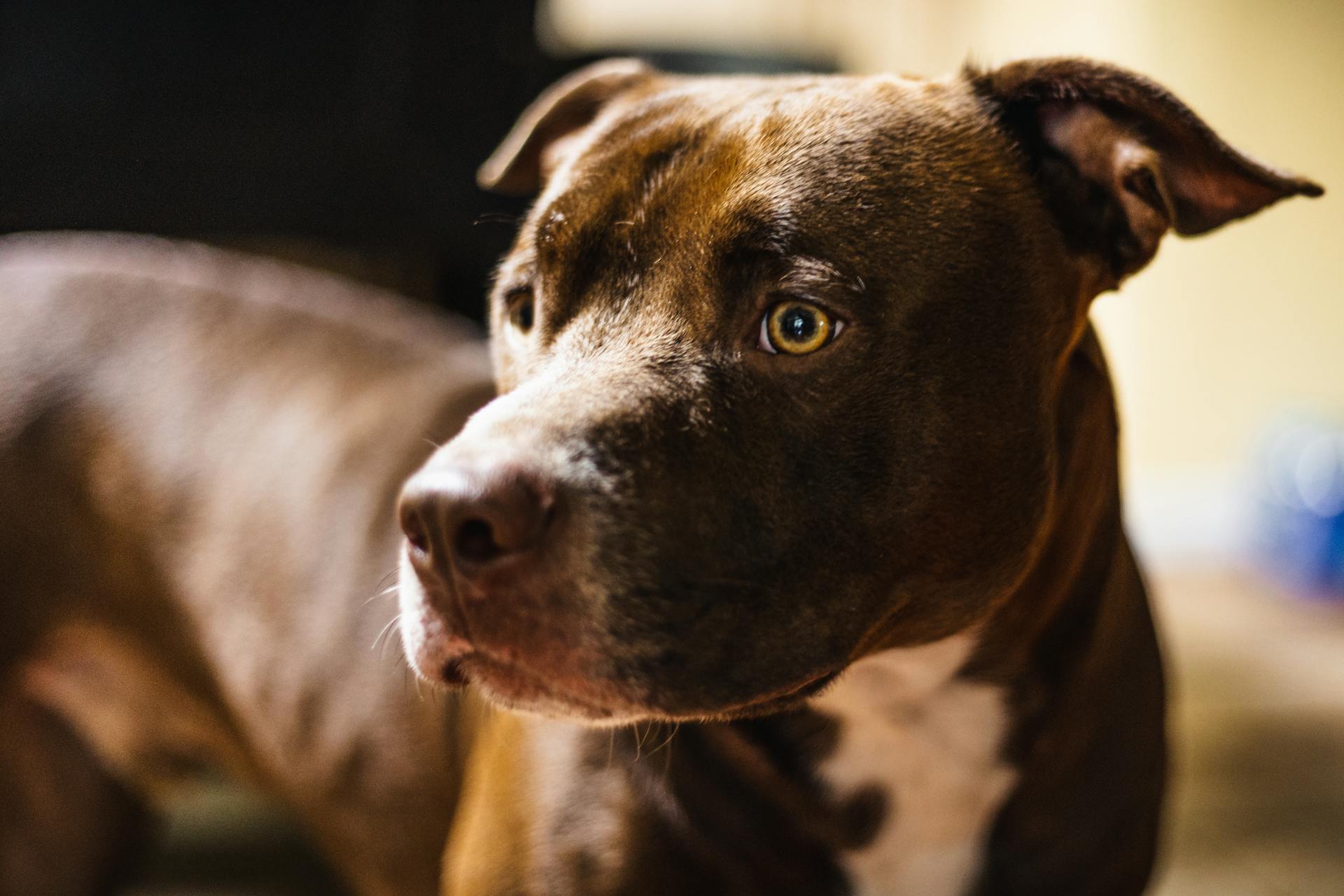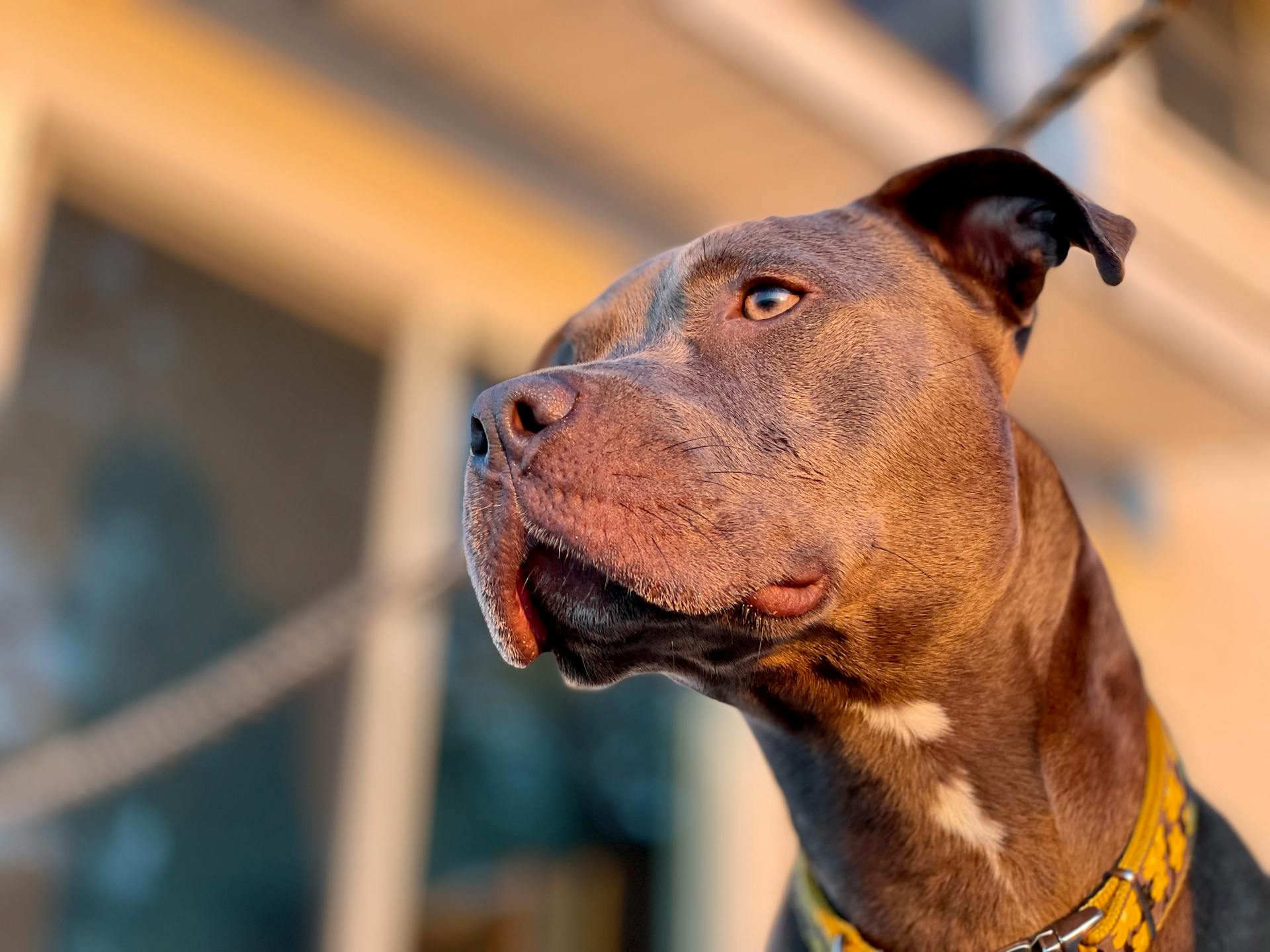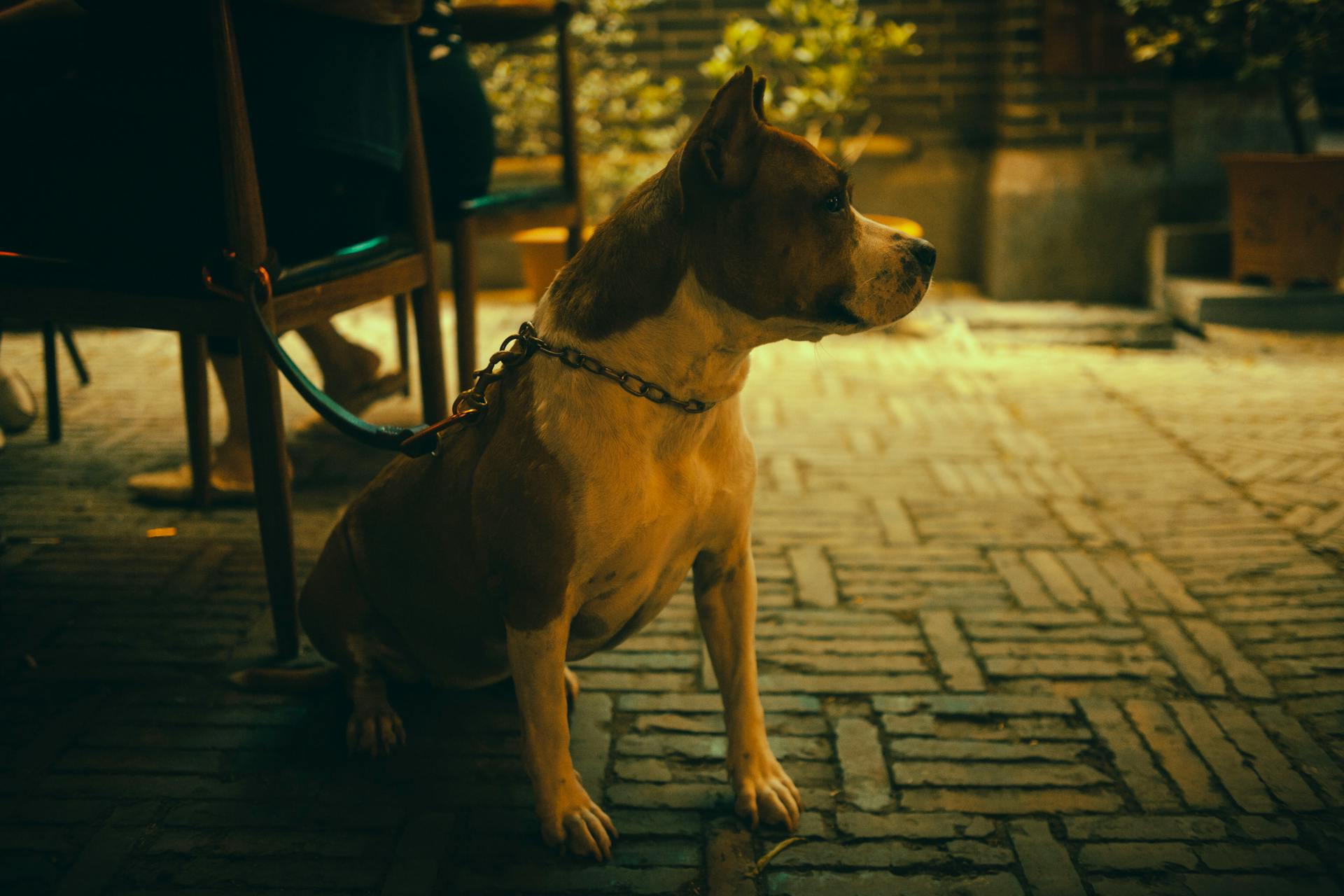
Pit Bulls can be great with kids if socialized properly from an early age. With the right training and care, they can become loyal and loving family pets.
In fact, Pit Bulls are often described as "nanny dogs" because of their natural instinct to protect and care for children. This is due in part to their history as companions to families and their strong maternal instincts.
However, it's essential to remember that every dog is an individual, and some Pit Bulls may not be suitable for families with young children. This is why it's crucial to research and understand the specific needs and temperaments of the dog you're interested in bringing home.
Ultimately, with patience, love, and proper training, Pit Bulls can thrive as loving and gentle companions for kids of all ages.
Related reading: How to Care for a Yorkie Dog
Pit Bull Care Basics
Pit Bulls are known for their loving nature, outgoing personality, and affection toward their humans.
They require regular exercise and playtime, usually at least 45 minutes to one hour a day, to keep them happy and healthy.
Pit Bulls enjoy going for walks, playing fetch, agility training, and anything that allows them to connect with their pet parent in an active way.
With the right socialization and training, Pit Bulls can make great family pets, but without it, they could become reactive in new or unfamiliar situations.
They are highly intelligent dogs and eager to please, which makes training straightforward, but they can be strong-willed at times.
A Pit Bull's high energy level means they do best with routine and structure, and can be wonderful companions for the right person.
Potential pet parents should be ready to devote time and attention to training, socialization, and exercise, as American Pit Bull Terriers can be strong-willed and require consistent positive reinforcement.
Pit Bulls can become easily overexcited and may need help learning how to behave in new situations.
They might do best in a home without small children, as they can be too exuberant and may unintentionally knock over smaller kids.
Explore further: New York Bernese Mountain Dog Breeders
Health Issues
Pit bulls can be great with kids, but they do have some health issues to consider. According to studies, pit bulls are prone to hip dysplasia, a condition that can lead to arthritis and mobility problems.
Their short coats require regular grooming, but they are generally easy to maintain. Pit bulls also need regular exercise to stay healthy and happy.
Pit bulls can be prone to skin allergies and infections, which can be painful and uncomfortable for them. This is often due to their skin folding, which can trap allergens and irritants.
Their short stature can also make them more susceptible to heatstroke, especially in hot climates. Pit bulls need plenty of shade, water, and breaks in the heat.
Pit bulls can be prone to heart problems, including arrhythmias and cardiomyopathy. Regular check-ups with a veterinarian can help catch these issues early on.
Their lifespan is typically 12-14 years, which is relatively average for a medium-sized breed.
For more insights, see: Long Haired Pembroke Welsh Corgi
Training
Training is key when it comes to raising a well-behaved pit bull, especially around kids. Pit Bulls are generally friendly, loyal, and eager to please, making them responsive to positive reinforcement training methods.
Consistency is crucial in training a pit bull, and they do best with a routine, established rules, and boundaries. Rewarding them with praise, treats, and affection encourages good behavior and reinforces the bond between dog and human.
To socialize your pit bull, start early, typically between 3 and 14 weeks of age, when they're more receptive to new experiences. Positive reinforcement techniques like treats, praise, and play help them associate positive experiences with new situations.
Gradual exposure to new experiences is also essential, starting with less overwhelming situations and progressing to more challenging ones as they become more comfortable. Take your dog on walks in different neighborhoods, introduce them to other dogs at the park, and visit pet stores and public places with your pup.
A different take: Boston Terrier New England
Obedience training is vital in teaching your pit bull necessary skills, like how to walk on a leash, sit, stay, and come when called. Enroll your pup in obedience training classes to help them learn proper behavior in different situations.
Here are some key socialization steps to keep in mind:
- Start socializing your pup between 3 and 14 weeks of age
- Use positive reinforcement techniques like treats, praise, and play
- Gradually introduce your dog to new experiences
- Take your dog on walks in different neighborhoods and visit public places
- Enroll your pup in obedience training classes
Pit Bull and Family
Pit Bulls are known for their loving nature and outgoing personality, making them great family pets. With the right socialization and training, they can thrive in a family environment.
Pit Bulls require regular exercise and playtime, usually at least 45 minutes to one hour a day. This can include activities like going for walks, playing fetch, and agility training.
While they can be strong-willed at times, Pit Bulls are highly intelligent dogs and eager to please, making training straightforward. However, without proper training and socialization, they could become reactive in new or unfamiliar situations.
Here are some key characteristics to consider when thinking about Pit Bulls and family:
Overall, with the right care and attention, Pit Bulls can make wonderful companions for families who are willing to provide the necessary structure and exercise.
How to Feed
Feeding your Pit Bull can be a straightforward process if you follow a few simple guidelines. Pit Bulls are prone to gaining weight easily, so it's essential to choose a food that's low in fat and calories.
Consult with your veterinarian to get personalized recommendations based on your dog's age, health, and nutritional needs. They can help you choose a high-quality food that's approved by the Association of American Feed Control Officials (AAFCO).
Most adult Pit Bulls do well on two meals a day: one in the morning and one in the evening. This regular schedule can help keep your dog's energy levels stable.
Pit Bull puppies and senior dogs may benefit from smaller, more frequent feedings to meet their unique nutritional needs. It's also a good idea to use heavy-duty stainless steel or ceramic feeding bowls to prevent your Pit Bull from chewing or damaging plastic bowls with their powerful jaws.
See what others are reading: How Much to Feed Bernese Mountain Dog Puppy
Good Family Dogs?
Pit Bulls are known for their loving nature, outgoing personality, and affection toward their humans. They can make great family pets with the right socialization and training.
Pit Bulls are highly intelligent dogs and eager to please, which makes training straightforward. However, without proper training and socialization, they could become reactive in new or unfamiliar situations.
A high-energy Pit Bull requires regular exercise and playtime, usually at least 45 minutes to one hour a day. They enjoy going for walks, playing fetch, agility training, and anything that allows them to connect with their pet parent in an active way.
The perfect home for a Pit Bull is one with an active family who enjoys spending time outdoors. This breed loves to play and exercise, so a backyard or park is a must.
Pit Bulls are strong-willed and require consistent positive reinforcement. They can become easily overexcited and may need help learning how to behave in new situations.
Discover more: Bernese Mountain Dog Exercise
Here are some key characteristics to consider when deciding if a Pit Bull is a good fit for your family:
With proper care, training, socialization, and attention, a Pit Bull can make a loving, loyal, and entertaining companion.
Fun Activities for Kids
Pit Bulls are natural-born athletes and love to stay active, which makes them perfect companions for families who enjoy outdoor activities.
Pit Bulls are highly intelligent and respond well to positive reinforcement training, making them great candidates for agility training and dog sports.
They're also natural protectors of their families and can be trained to be gentle with children, as seen in the example of a Pit Bull named Max who was trained to be a therapy dog.
Pit Bulls thrive on structure and routine, which makes them well-suited for families with kids who have set schedules and activities.
A daily walk and playtime can help burn off excess energy and keep your Pit Bull happy and healthy.
Responsible Pet Ownership
As a responsible pet owner, it's essential to consider the needs and temperaments of your furry friends. Pit Bulls, in particular, require consistent positive reinforcement and training to ensure they become well-behaved and loving companions.
Pit Bulls are strong-willed dogs that need attention and exercise to thrive. They can become easily overexcited and may need help learning how to behave in new situations. Regular training and socialization are crucial to help them develop good manners and interact well with others.
To become a knowledgeable and responsible pet owner, take advantage of resources like local animal shelters or rescue organizations. These groups often offer training classes and workshops on various topics, including obedience and behavioral issues. You can also find helpful tips and advice on websites, books, and blogs dedicated to pet ownership.
By prioritizing your Pit Bull's training and socialization, you'll be well on your way to becoming a confident and caring pet parent. With patience, consistency, and positive reinforcement, you can help your Pit Bull grow into a loving and loyal companion for years to come.
Broaden your view: Water Loving Dogs for Short Nyt
Here are some key considerations to keep in mind when it comes to responsible pet ownership:
- Provide regular exercise and mental stimulation to keep your Pit Bull happy and healthy.
- Invest time and effort into training and socialization to help your Pit Bull develop good manners and interact well with others.
- Be prepared to devote time and attention to your Pit Bull's needs, including training, socialization, and exercise.
- Consider your lifestyle and living situation to ensure it's suitable for a high-energy breed like the Pit Bull.
Frequently Asked Questions
Do pitbulls get aggressive with age?
Aggression in pit bulls is not determined by age, but rather by factors like training, socialization, and individual temperament
What age do pitbulls calm down?
Pitbulls typically remain energetic until around 5 years of age, after which regular exercise and mental stimulation can help them calm down. Regular physical activity, such as running and agility training, can help channel their energy and prevent destructive behavior.
Do pitbulls like to cuddle?
Pitbulls are known to be affectionate and love human interaction, making them great cuddlers. They thrive on physical touch and attention, making them perfect companions for those who enjoy snuggling.
Sources
- https://www.thehumanesociety.org/debunking-pit-bull-myths/
- https://www.petmd.com/dog/breeds/american-pit-bull-terrier
- https://puffandfluffspa.com/are-pitbulls-good-family-dogs/
- https://www.lifewithdogs.tv/are-pit-bulls-dangerous/
- https://animalfoundation.com/whats-going-on/blog/pit-bulls-make-great-family-pets
Featured Images: pexels.com


